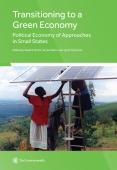The paper examines the significance of social policy towards growth of a green economy with particular reference to South Africa. As such, the roles identified are that social policy: constructs ideological foundations which enhance growth of a green economy, promotes efficiency of green economy advancement, improves competitiveness of green economy emancipation and enables sustainability participation required of private firms and financial entities thereby enhancing establishment of a green economy when adopting economic market policies. Further, the paper outlines specific recommendations which are essential towards constructing a green economy by developing an efficient social policy in South Africa.
In the first dispute on renewable energy to come to World Trade Organization (WTO) dispute settlement, the domestic content requirement of Ontario’s feed-in tariff was challenged as a discriminatory investment-related measure and as a prohibited import substitution subsidy. The panel and Appellate Body agreed that Canada was violating the GATT and the TRIMS Agreement. But the SCM Article 3 claim by Japan and the European Union remains unadjudicated, because neither tribunal made a finding that the price guaranteed for electricity from renewable sources constitutes a ‘benefit’ pursuant to the SCM Agreement. Although the Appellate Body provides useful guidance to future panels on how the existence of a benefit could be calculated, the most noteworthy aspect of the new jurisprudence is the Appellate Body’s reasoning that delineating the proper market for ‘benefit’ analysis entails respect for the policy choices made by a government. Thus, in this dispute, the proper market is electricity produced only from wind and solar energy.
Questions of justice in the transition to a green economy have been raised by various social forces. Very few proposals, however, have been as focused and developed as the “just transition” strategy proposed by global labour unions. Yet, labour unions are remarkably absent from discussions of the transition towards a green economy. This is surprising as labour unions are arguably the largest organizations in the world fighting for basic rights and more just social relations. This paper tries to advance the potential contribution of labour unions in this arena by asking: what is the full scope of “just transition” today and how have labour unions developed and refined it over the years to render the move towards a green economy both environmentally and socially sustainable? The concept of just transition is hotly debated within labour unions and has different interpretations, and hence different strategies. The last section assesses these interpretations by means of a normative framework, which seeks to fuse political economy and political ecology. Empirically, the authors add to the growing literature on labour environmentalism, as well as transitions more generally.

While the term ‘green economy’ has been widely used at the international level, very little information exists about what the concept looks like in practice. It remains to be explored what policies are required, and what the challenges of implementation at national level are.
This book contains case studies from eight small states that have committed publicly to greening their economies: Botswana, Grenada, Guyana, Jamaica, Mauritius, Nauru, Samoa and Seychelles. It provides insights into the success of various initiatives and highlights how small states themselves are making practical progress on a green economy approach.

At the Davos forum of January 2014, a group of 14 countries pledged to launch negotiations on liberalizing trade in "green goods" (also known as "environmental" goods), focusing on the elimination of tariffs for an Asia-Pacific Economic Cooperation list of 54 products. The paper shows that the Davos group, with an average tariff of 1.8 percent, has little to offer as countries have avoided submitting products with tariff peaks for tariff reductions. Even if the list were extended to the 411 products on the World Trade Organization list, taking into account tariff dispersion, the tariff structure on environmental goods would be equivalent to a uniform tariff of 3.4 percent, about half the uniform tariff-equivalent for non-environmental goods. Enlarging the number of participants to low-income countries might be possible as, on average, their imports would not increase by more than 8 percent. However, because of the strong complementarities between trade in environmental goods and trade in environmental services, these should also be brought to the negotiation table, although difficulties in reaching agreement on their scope are likely to be great.
